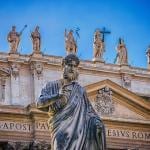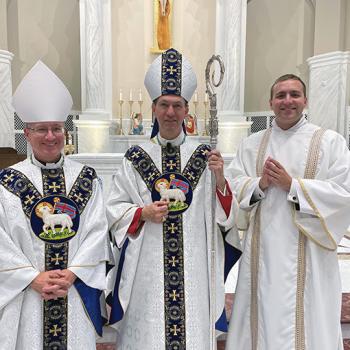In the previous two articles there has been much said about apostolic succession, but I think some clarification is in order. Apostolic succession is much more than one taking an office from a predecessor, though that is part of it.
In combating the Gnostics, St. Irenaeus listed apostolic succession as a key to knowing the true church. The great saint boasted in each bishop being able to trace his lineage to the apostles. Today each bishop in the Catholic Church has a lineage that is traceable.
Apostolic Succession: Definition
In the early days of the church succession and tradition were like terms and were synonymous with the Greek word diadochí (Benedict XVI, 23). Tradition involves teaching, but again it is much more than that. It is forever linked to the person from whom that teaching derives.
Pope Emeritus Benedict XVI writes that tradition is “linked to a person, is a living word, that has its concrete reality in faith” (Benedict XVI, 23). Succession is proclaiming something that had been entrusted to someone by Christ himself. In Apostolic succession the lineage is not mutually exclusive from the teaching. The two go hand in hand.

What Was Taught In The Beginning
Throughout the Arian controversy, and the modern variations there has been one constant. The constant is deviation from what was taught in the beginning. Apostolic succession is “holding fast to the apostolic word, just as tradition means the continuing existence of authorized witnesses” (Benedict XVI, 24).
Apostolic succession and apostolic tradition assist in defining each other. The succession is the form of the tradition, and the tradition is the content of the succession (Benedict XVI, 28)
Apostolic Succession Preserves Truth
It is very tempting to look at the Arian controversy and think that it is a thing of the past. This is irresponsible from a theological and historical perspective. The denying of the divinity of Christ is still something that is an issue among those who call themselves Christians.
Jehovah’s Witnesses and Mormons have a view of Christ that is contrary to scripture and to the tradition of the Church. There are other denominations that deny the Trinity and therefore have an improper view of Christ. What would Christianity be like today if the bishops in Alexandria and Nicea did not exercise the authority given to them by apostolic succession?
The infant Christian church would have experienced a sizable schism. The Roman empire may have possibly collapsed and been thrown into utter chaos. It would have been a disaster.
There were men who resisted the temptation, stayed faithful, and championed the cause of apostolic teaching. This is the way our Lord Jesus Christ set things up. He established a Church with Apostolic Succession to help guide the flock in the way of the master.
As Pope Emeritus Benedict XVI states, “Apostolic succession” is by its nature the living presence of the word in the personal form of the witness. The unbroken continuity of witnesses is derived from the nature of the word as authority and oral statement” (Benedict XVI, 31).
Saint Quotes
But, again, when we refer [the gnostics] to that tradition which originates from the apostles, which is preserved by means of the succession of elders in the churches, they object to tradition, saying that they themselves are wiser not merely than the elders, but even than the apostles.- St. Irenaeus
Our apostles also knew … there would be strife on account of the office of bishop. For this reason … they appointed those [ministers] already mentioned, and afterwards gave instructions that when these should fall asleep, other approved men should succeed them in their ministry. We are of opinion, therefore, that those appointed by them—or afterwards by other eminent men with the consent of the whole Church—and who have blamelessly served the flock of Christ in a humble, peaceable, and disinterested spirit, and have for a long time possessed the good opinion of all, cannot be justly dismissed from the ministry. For our sin will not be small, if we eject from supervision those who have fulfilled its duties blamelessly and in holiness.- St. Clement of Rome
Why do [Arian bishops] reject [the synod] at Nicaea, at which their fathers signed the confession that the Son is of the Father’s substance and consubstantial with him? For now they are at war not only with the bishops who met at Nicaea, but with their own great bishops and their own friends. Whose heirs or successors then are they? How can they call men fathers, whose confession, well and apostolically drawn up, they will not accept?- St. Athanasius
Works Cited
Benedict XVI. God’s Word: Scripture—Tradition—Office. Ed. Peter Hünermann and Thomas Söding. Trans. Henry Taylor. San Francisco: Ignatius Press, 2008. Print.













